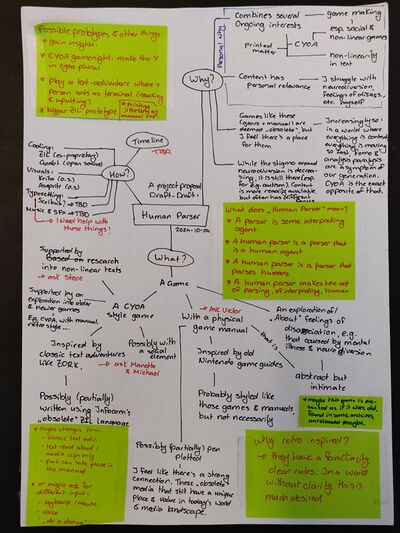User:Thijshijsijsjss/PTMoMNBM/Human Parser
Disclaimer: despite being lengthier, more detailed and perhaps even more ambitious in scope and captured interests, this is still a Project that May or may not be made. Don't forget that, Thijs!
A parser is an interpreting agent -- what is a 'human parser?'
A human parser is an interpreter that happens to be a human agent
A human parser is an interpreter that parses humans
A human parser makes the act of parsing, or interpreting, human
What do you want to make? Human Parser is a project around a Choose Your Own Adventure (CYOA) style game that is an exporation of the disassociative feelings caused by mental illness and neurodiversion. This exploration is abstract yet intimate, stemming from personal experiences of myself and others.
The gameplay content is yet to be determined, but is inspired by old text adventure and retro games. It will likely contain 2D 'pixel art' visuals. The starting point for the game is digital, but based on testing during development, elements or everything might turn physical or immaterial.
The game is accompanied by a physical game manual, providing insights into the game and adding more thematic cohesion. It might contain visuals taken and / or re-imagined from the game, guides for gameplay, behind the scenes info, but also a broader exploration of the theme through e.g. interview snippets.
Why do you want to make it? Text adventure and CYOA games are often seen as relics of the past, "obsolete" genres, but I feel like there is still a place for them. In fact, increasingly so: in the current world, everything is content, everything is moving fast, and every moment is a moment of decision. Amidst this constant overwhelming exposure, "FOMO" and analysis paralysis are symptoms characterising a generation. CYOA fundamentally opposes the idea of mass content, of experiencing it all.
One group of people who tend to struggle more in this landscape are neurodivergent people (citation needed). While the stigma surrounding this topic is slowly decreasing, it still persist. Especially in big media, representation is sparse and, if present at all, heavily stereotyped. There is room for more authentic experiences and representations. By their interactive and explorative nature, games could be a good carrier for such a conversation.
I myself feel the need for this conversation. Mental illness and neurodiversion have defined important parts of my life so far, and I often struggle with feelings of disassociation. I have started to explore these themes in previous projects, and feel like these have been just the tip of the iceberg. This project would allow me to continue the exploration of not just this theme, but also of several media of interest: gamemaking (and CYOA), printmaking (possibly involving pen plotters or web-to-print).
Moreover, I feel like a game manual -- similar in its status as 'obsolete' -- fits this project well. Firstly, thematically: neurodivergent people are often told to come with 'their manual'. What is a manual anyway, when it comes to people? Also, it fits mechanically: in the contemporary landscape of interwoven media, I see potential for it to breath new life in the CYOA genre, extending decision making beyond the digital realm and blurring the thematic and gameplay content.
I have the hopes for this project to be both an relatable experience to those struggling with disassociation themselves, and an interesting game in its own right to be enjoyed by any lover of classic videogames. This second point is important to me: the game should not just be academically interesting, but an actual worthwhile playable experience.
How do you plan to make it? Realising this project will require two interwoven phases: research and creation.
The 'how' of research involves:
|
The 'how' of creation involves:
|
The methods used above are merely starting points. While working on this project, I expect many more questions of 'how' to pop up. I will embrace this.
What is your timetable?
Who can help you?
Relation to previous practise
Relation to a larger context
References / bibliography

